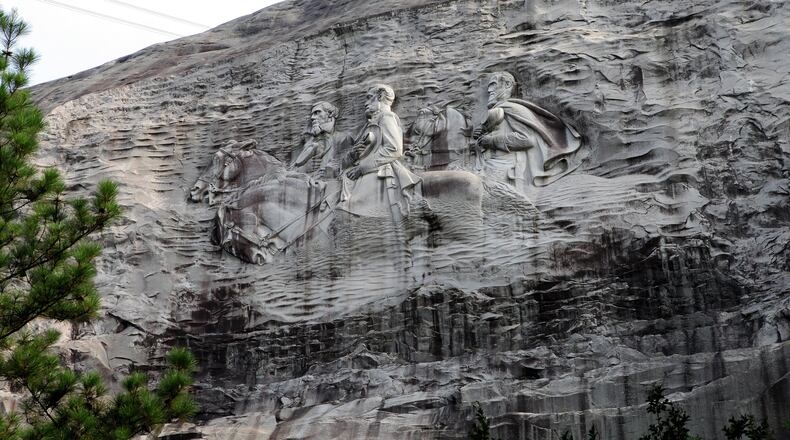Leaders of the small city sitting next to the world’s largest Confederate memorial, the site of recent protests against racism, say they “actively encourage peaceful protest in support of social justice.”
In a statement Thursday, the city of Stone Mountain also said it is reviewing its police department policies to ensure officers are trained on proper use-of-force tactics. The announcement followed nationwide calls for police reform in response to the death of George Floyd in Minneapolis and other black people who have died at the hands of police officers.
“We as a city and a community pledge to listen to the voices calling for change, to join the footsteps of those marching for change, and to do our part to be an active participant in that change,” the statement said. Several other cities in metro Atlanta have released similar statements or passed ordinances denouncing racism and supporting peaceful protesters.
For many, Stone Mountain is historically known for its links to racist organizations including the Ku Klux Klan, who in 1915 held a rally symbolizing the “rebirth” of the organization. The mountain’s carving features three Confederate figures, Jefferson Davis, Robert E. Lee and Stonewall Jackson.
The city of Stone Mountain in central DeKalb County is now majority black. It does not have jurisdiction over Stone Mountain Park, including the carving, which is run by the Stone Mountain Memorial Association, a state organization.
Over the years, officials and residents have called for the removal of the carving, saying it glorifies people who supported slavery and bigotry.
Credit: Special to the AJC
Credit: Special to the AJC
At a recent protest at Stone Mountain, 19-year-old organizer Zoe Bambara addressed the history of the space.
“Confederate soldiers fought to continue to oppress my community, with white supremacy running through their veins,” she said during a speech. “We know who and what those soldiers stood for.”
Bambara said she received no pushback from Stone Mountain city leaders while planning the event. She said her event permit was approved in just 18 hours.
The city said it has partnered with Stone Mountain Park Police, the DeKalb County Sheriff’s Office, DeKalb police, the GBI and the Georgia National Guard to “protect the residents, businesses, and protesters by de-escalating the tensions surrounding occurrences of racial injustice to create a safe space for the people to exercise their first amendment rights.”
Leaders also plan to call on the state to pass a hate crime law would impose additional penalties on crimes proven to have been motivated by bias. Several other governments, including Doraville, Marietta and Cobb County, have passed similar resolutions calling for the passage of House Bill 426.
The city has expressed a desire to move on from its negative history and reputation. Last year, residents in a historically black Stone Mountain neighborhood spoke up about a road called “Venable Street,” named for the family that used to own Stone Mountain. Several members of the Venable family were prominent members of the KKK, according to archives and records.
The City Council voted to rename the street to “Eva Mamie Lane,” combining the names Eva Jewell Greene and Mamie Ella Lane, a mother-daughter duo who were leaders in the local black community.
— Staff reporter Asia Simone Burns contributed to this report.
About the Author
Keep Reading
The Latest
Featured



